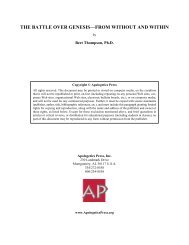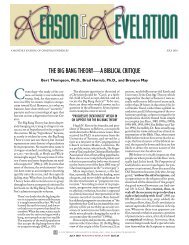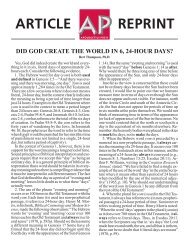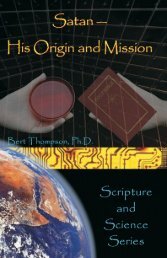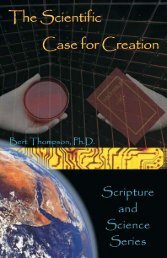The Many Faces, and Causes, of Unbelief - Apologetics Press
The Many Faces, and Causes, of Unbelief - Apologetics Press
The Many Faces, and Causes, of Unbelief - Apologetics Press
Create successful ePaper yourself
Turn your PDF publications into a flip-book with our unique Google optimized e-Paper software.
God gives the man over to the belief <strong>of</strong> the lie which<br />
he prefers. In a sense it might be said that the means<br />
by which a person is deceived is God’s permissive<br />
agency—not God’s direct agency (1968, p. 157).<br />
<strong>The</strong>re is an exact parallel in the instance <strong>of</strong> the Pharaoh<br />
who sparred with Moses <strong>and</strong> Aaron over the release <strong>of</strong> the<br />
Hebrews from Egyptian bondage. When these two brothers<br />
arrived at Pharaoh’s court as God’s ambassadors to dem<strong>and</strong><br />
the release <strong>of</strong> the enslaved Israelites, they told the pagan potentate:<br />
“Thus saith Jehovah, the God <strong>of</strong> Israel, ‘Let my people<br />
go’.” Pharaoh’s response, preserved in Scripture for posterity,<br />
foreshadowed the attitude <strong>of</strong> millions <strong>of</strong> unbelievers<br />
who would imitate the militant monarch’s demeanor <strong>of</strong> disbelief<br />
throughout the course <strong>of</strong> human history: “Who is Jehovah,<br />
that I should hearken unto his voice to let Israel go? I<br />
know not Jehovah, <strong>and</strong> moreover I will not let Israel go”<br />
(Exodus 5:1-2, emp. added).<br />
Several times the biblical text records that it was God Who<br />
“hardened Pharaoh’s heart” (Exodus 7:3; 9:12; 10:1,20,27;<br />
11:10; 14:8). Are we to underst<strong>and</strong>, therefore, that God caused<br />
Pharaoh’s stubborn attitude <strong>of</strong> disbelief? Certainly not. <strong>The</strong><br />
simple fact <strong>of</strong> the matter is that God did not cause Pharaoh to<br />
harden his heart <strong>and</strong> disobey, but instead permitted the ruler’s<br />
actions. <strong>The</strong> Scriptures speak to this point when they acknowledge<br />
that Pharaoh himself “hardened his heart” (Exodus 8:<br />
15,32; 9:34-35). In their commentary on the Pentateuch, Keil<br />
<strong>and</strong> Delitzsch addressed Pharaoh’s hardness <strong>of</strong> heart, even<br />
after he witnessed the miraculous plagues sent by God.<br />
After every one <strong>of</strong> these miracles, it is stated that Pharaoh’s<br />
heart was firm, or dull, i.e. insensible to the<br />
voice <strong>of</strong> God, <strong>and</strong> unaffected by the miracles performed<br />
before his eyes, <strong>and</strong> the judgments <strong>of</strong> God<br />
suspended over him <strong>and</strong> his kingdom.... Thus Pharaoh<br />
would not bend his self-will to the will <strong>of</strong> God,<br />
even after he had discerned the finger <strong>of</strong> God <strong>and</strong> the<br />
omnipotence <strong>of</strong> Jehovah in the plagues suspended<br />
over him <strong>and</strong> his nation; he would not withdraw his<br />
haughty refusal, notwithst<strong>and</strong>ing the fact that he was<br />
-5



